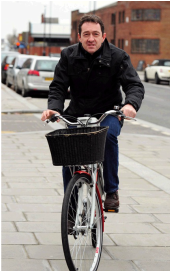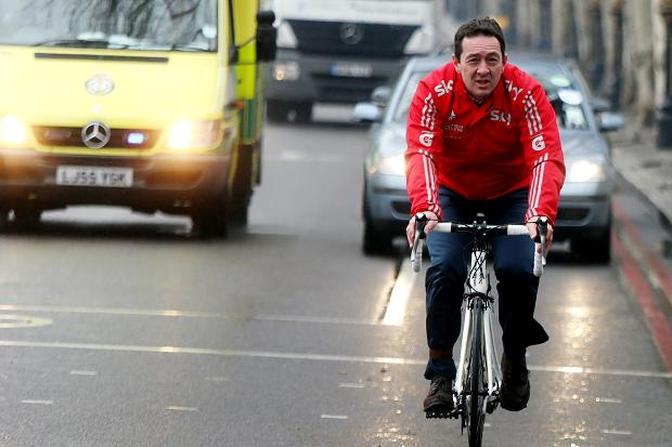 Chris Boardman tries out a cycle hire scheme in Liverpool
Chris Boardman tries out a cycle hire scheme in Liverpool
PEDALLING INTO THE FUTURE?
Chris Boardman,
legendary professional rider
and now British Cycling’s policy advisor,
explores the urban challenge
in an article for "AA Magazine"
Chris Boardman,
legendary professional rider
and now British Cycling’s policy advisor,
explores the urban challenge
in an article for "AA Magazine"
There’s no doubt that cycling is a topic that generates a lot of public opinion. But I’m more interested in the bigger picture – an issue that isn’t even about cycling. I want to talk about what we want the places we live to look like in 20 years.
Ask most people if they would like to live in a place where their children would be able to cycle or walk to school; where people are fitter, healthier and happier; where there was less congestion and better air quality; where shops and restaurants thrive – the resounding answer would, of course, be yes.
If we work on the basis that this is something that most people would like for themselves and their families, then the next question is obvious – what do we need to do to get there? Only by defining the destination can we know if the things we are doing – the modes of transport we are using – are getting us closer to it or further away.
I’m not pro-bicycle particularly, I’m simply pro-logic. Mountains of evidence tell us that the bicycle is a key tool, the most logical tool, to make this vision a reality. If you need proof, it is all around us. It’s no coincidence that the cities regularly topping world polls for quality of life and happiness have high bicycle use.
Make your town 'people-friendly'
If we want Britain to be a better place, then we have to take steps to make this people-friendly form of transport a safe and attractive choice for people. Speed limits in urban areas need to come down. Where they can’t, segregated cycling lanes should be created. Cycling must be accommodated or, better still, prioritised at junctions.
Cheap steps
I recently had the pleasure of visiting Cambridge, a community that has already collectively embraced cycling and walking as its preferred means of transport. More than 20 per cent of all trips there are made by bike, and at peak times it’s more than 30 per cent. The city is now aiming to get this up to 40 per cent, which would be even more than The Netherlands. This has only happened because the council made cycling not only safe but also an easy, convenient and attractive choice.
The financial costs of doing this are relatively cheap – around £1 billion per year. It sounds a lot but it amounts to just five per cent of Britain’s transport spend.
What can you do to help?
Give politicians the courage to make that commitment. Just a few emails asking your newly elected MP what he or she intends to do for cycling can have a profound effect on their view of local transport priorities. It can give them confidence to make bold decisions and encourage councils to be more ambitious.
Remember, this is not about cycling. That is just a means to an end. It’s about making nicer places for us and our kids to live. It’s also worth noting that people who ride bikes also drive cars. Nine out of 10 of British Cycling’s 100,000-strong membership are motorists.
Promoting cycling doesn’t mean being anti-car
In fact, it’s about saying that less congestion is good for everyone, including those who drive. This is not a campaign for lyrca-wearing cyclists but a transport solution for normal people in normal clothes.
The question I’ll leave you to ponder – one I have asked myself and the reason I campaign for cycling and walking – is this.
Ask most people if they would like to live in a place where their children would be able to cycle or walk to school; where people are fitter, healthier and happier; where there was less congestion and better air quality; where shops and restaurants thrive – the resounding answer would, of course, be yes.
If we work on the basis that this is something that most people would like for themselves and their families, then the next question is obvious – what do we need to do to get there? Only by defining the destination can we know if the things we are doing – the modes of transport we are using – are getting us closer to it or further away.
I’m not pro-bicycle particularly, I’m simply pro-logic. Mountains of evidence tell us that the bicycle is a key tool, the most logical tool, to make this vision a reality. If you need proof, it is all around us. It’s no coincidence that the cities regularly topping world polls for quality of life and happiness have high bicycle use.
Make your town 'people-friendly'
If we want Britain to be a better place, then we have to take steps to make this people-friendly form of transport a safe and attractive choice for people. Speed limits in urban areas need to come down. Where they can’t, segregated cycling lanes should be created. Cycling must be accommodated or, better still, prioritised at junctions.
Cheap steps
I recently had the pleasure of visiting Cambridge, a community that has already collectively embraced cycling and walking as its preferred means of transport. More than 20 per cent of all trips there are made by bike, and at peak times it’s more than 30 per cent. The city is now aiming to get this up to 40 per cent, which would be even more than The Netherlands. This has only happened because the council made cycling not only safe but also an easy, convenient and attractive choice.
The financial costs of doing this are relatively cheap – around £1 billion per year. It sounds a lot but it amounts to just five per cent of Britain’s transport spend.
What can you do to help?
Give politicians the courage to make that commitment. Just a few emails asking your newly elected MP what he or she intends to do for cycling can have a profound effect on their view of local transport priorities. It can give them confidence to make bold decisions and encourage councils to be more ambitious.
Remember, this is not about cycling. That is just a means to an end. It’s about making nicer places for us and our kids to live. It’s also worth noting that people who ride bikes also drive cars. Nine out of 10 of British Cycling’s 100,000-strong membership are motorists.
Promoting cycling doesn’t mean being anti-car
In fact, it’s about saying that less congestion is good for everyone, including those who drive. This is not a campaign for lyrca-wearing cyclists but a transport solution for normal people in normal clothes.
The question I’ll leave you to ponder – one I have asked myself and the reason I campaign for cycling and walking – is this.
"What will my village look like for me and my kids in 10 years if we don’t change?
Is that the place I want to live?"
OPEN MEETING to discuss Chris Boardman's URBAN CHALLENGE
7pm Wed 8th July 2015
in Golf Road Community Centre, Deal
7pm Wed 8th July 2015
in Golf Road Community Centre, Deal
